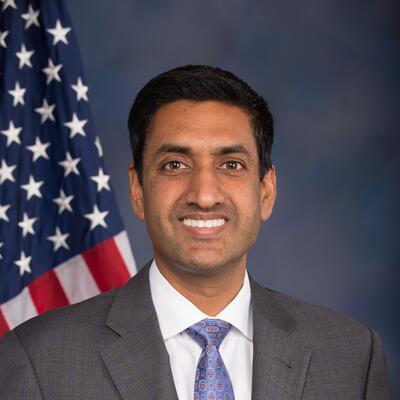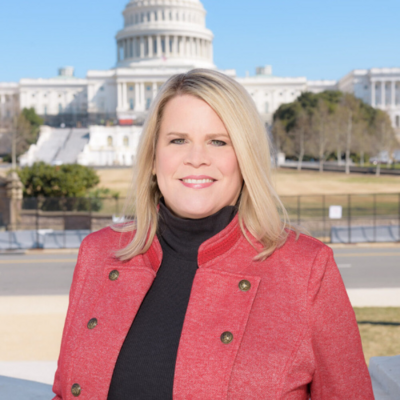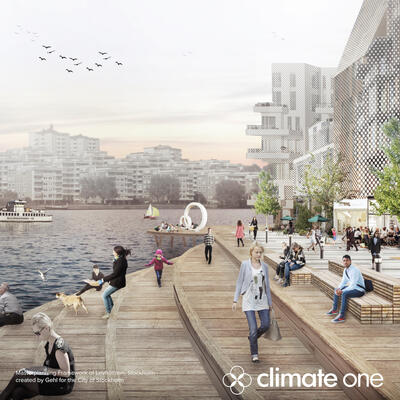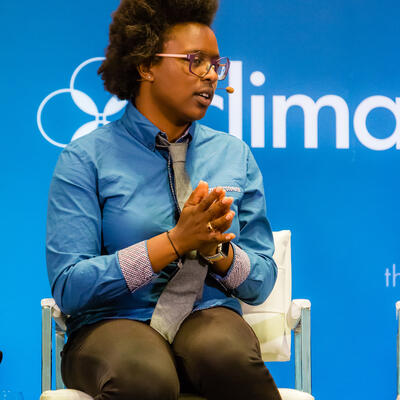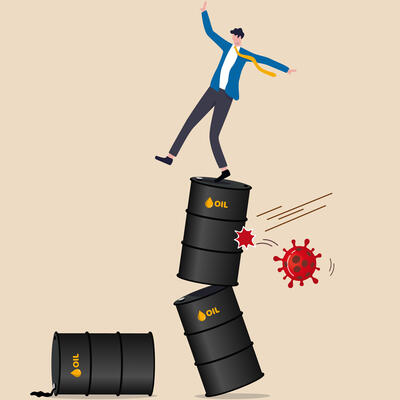
COVID-19 and Climate: The Future of Energy
Guests
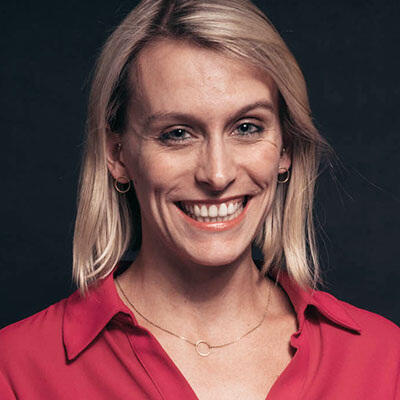
Amy Harder
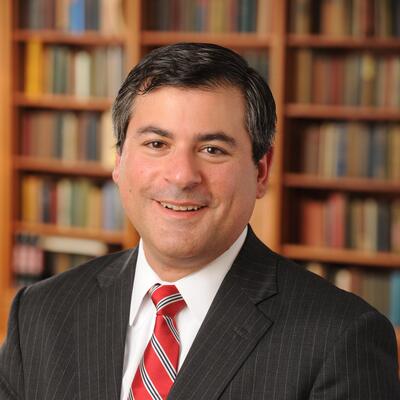
Jason Bordoff

Scott Jacobs

Julia Pyper
Summary
If you lived through the oil crisis of the 1970’s, you remember lines of cars at the gas stations, waiting to fill up on “alternate days.” Now, after decades of relying on imported oil, the U.S. achieved the unthinkable and became the world’s largest producer. Production has doubled over the past decade, and in February reached its highest level ever - thirteen million barrels a day.
But as it turns out, all of that overabundance, combined with the current coronavirus pandemic, has led to a different kind of oil crisis.
“We’re producing more oil and gas than ever and this industry’s stocks are tanking,” says Amy Harder, energy reporter for Axios. “And that was because they have basically drilled their way into financial hell where there’s obviously zero coordination.
“So everybody is just producing more and more oil and there’s too much oil in the world before demand dropped off a cliff.”
The nationwide shut-down caused by COVID-19 has taken its toll on the economy, with the fossil fuel industry being one of the biggest losers.
“Normally you would see prices fall, people would stop investing and start to have some declines in production,” says Jason Bordoff of the Center on Global Energy Policy. “We don't have enough places physically to store all of this oil that was being produced.”
But not all kinds of energy are suffering the same. As Harder explains, renewables are experiencing unprecedented growth.
“And now that it exists all over the world,” she continues, “it's going to be the plant that stays running when, you know, countries and companies can shut down coal and natural gas plants.”
What will be the lasting impact of the COVID-19 recession? How will this reshape use of clean energy sources in the years to come?
In a post-pandemic world, we can hardly expect that everything will return to the way it was before. Until a reliable vaccine is developed, air travel, retail shopping, dining out, going to school and other aspects of life will be drastically altered to reduce the risk of infection. Rather than striving for the green workplace of the future, many companies may decide that the future means no workplace at all.
“I think it’s just a step too far removed to try to make the argument that buildings need to be more energy efficient in this new world,” says Harder. “I think …companies might be looking to invest less in their buildings and more in telework opportunities.”
Additional interview: Chris Rawlings, founder of Veteran L.E.D.
Related Links:
Oil prices go below zero (Bloomberg)
Political Climate podcast
Carbon emissions, oil and more (Axios)
Columbia Center on Global Energy Policy
Generate Capital
This program was recorded via live stream on May 6, 2020.
Full Transcript
Greg Dalton: This is Climate One. I’m Greg Dalton. On today’s program: chaos in oil markets.
Jason Bordoff: Normally you would see prices fall, people would stop investing and start to have some declines in production. We don't have enough places physically to store all of this oil that was being produced.
Greg Dalton: The coronavirus pandemic has taken its toll on the economy, with the fossil fuel industry being one of the biggest losers. But not all kinds of energy are suffering the same.
Amy Harder: And that’s because unlike a decade ago in the economic recession in 2008 and ’09, there’s an incredible growth in the renewable energy industry. And now that it exists all over the world, it's going to be the plant that stays running when, you know, countries and companies can shut down coal and natural gas plants.
Greg Dalton: COVID-19 and climate: the future of energy. Up next on Climate One.
---
Greg Dalton: How will the COVID-19 crisis shape the future of energy?Climate One conversations feature oil companies and environmentalists, Republicans and Democrats, the exciting and the scary aspects of the climate challenge. I’m Greg Dalton.
After decades of relying on imported oil, the U.S. achieved the unthinkable and became the world’s largest producer. Production has doubled over the past decade, and in February reached its highest level ever - thirteen million barrels a day. But as it turns out, all of that overabundance has led to a different kind of oil crisis.
Amy Harder: They have basically drilled their way into financial hell where there’s...obviously zero coordination. So everybody is just producing more and more oil and there’s too much oil in the world before demand dropped off a cliff.
Greg Dalton: Amy Harder covers energy and climate change for Axios, and is a former reporter with The Wall Street Journal. What does the sudden plunge in oil prices bode for the economy? Jason Bordoff, a White House energy advisor to President Obama and Founding Director of the Center on Global Energy Policy at Columbia University, has a fairly dire prediction.
Jason Bordoff: So you’re gonna see U.S. shale production which was 13 million probably down something like 3 million by the end of the year. Hundreds of thousands of people in oil producing states, Oklahoma, Texas, North Dakota, etc. losing their job.
Greg Dalton: My guests today include Bordoff and Harder along with two other experts. Scott Jacobs, CEO and cofounder of Generate Capital, and Julia Pyper, co-host and producer of the Political Climate Podcast and a contributing editor at Greentech Media.
They’re all joining me from their homes to talk about the future of energy. What will be the lasting impact of the COVID-19 recession? How will this reshape use of clean energy sources in the years to come?
Let’s start with the current nailbiter - U.S. oil prices. Past presidents have counted on cheap gas prices in election years to help usher them back into the White House. By contrast, the current president has been talking up the price of oil. What does the plummeting market mean for the industry and for our economy? Jason Bordoff offers his perspective.
PROGRAM PART 1
Jason Bordoff: Yeah, it’s pretty extraordinary for President Trump. Not by any president in election year to celebrate higher gasoline prices, this one in particular because he spent most of his presidency complaining about gasoline prices not being low enough and has a long history of attacking OPEC. We’ve seen this unprecedented collapse in oil prices and in oil demand, obviously a result of putting the economy on hold to deal with the pandemic. 30 million barrels a day that’s 30% of global oil demand just wiped out in April prices falling. And the United States, you know, a decade ago was importing 60% of our oil. Now we are on the cusp of being a net oil exporter. So we basically stopped importing any oil at all. What that means is an oil price spike or an oil price crash hits our economy differently today than it did before. It still saves consumer’s money at the pump although we’re not driving that much anyway because people are on lockdown that doesn’t help them as much. But you’re gonna see more negative impacts in different states that produce oil for workers in those industries and that’ll be larger today than was the case ten years ago.
Greg Dalton: And we’ll get into that a little more later how oil is a bigger part of our domestic economy. Amy Harder, first I wanna ask you about a Bette Midler tweet that you told me about that kind of captures this moment. What did Bette Midler tweet?
Amy Harder: Yeah, well I’m a Bette Midler fan so I noticed her tweets. And the other day she tweeted something along the lines of “I feel like I’m 16 again, grounded and I can’t go out and drive.” And, you know, that’s kind of the public sentiment of the vast majority of the world which is not the oil industry. All of us kind of find it a little funny that gasoline prices are going to the toilet and we’re all mostly stuck at home. So this is a historic collapse in the industry as Jason said but most people don’t really care. And, you know, the oil industry has never been a sector about exactly engendered, you know, good will and sympathy. But because of the incredible growth in oil production and gas over the last decade it is a bigger part of our economy. But as long as we have people like Bette Midler tweeting jokes about the oil industry in crisis I think it’s gonna be hard to really convey to people that this is a crisis unlike say if gasoline and oil prices were skyrocketing.
Greg Dalton: We’re hearing that oil is a bigger part of the American economy, but, Amy Harder, energy is a shrinking part of the S&P 500. The value of energy stocks is a smaller part of Wall Street than it was 10 years ago. So help us understand how it's bigger and smaller at the same time.
Amy Harder: Yeah, well, I think an important part to understand about this corona crisis in particular is that the oil and gas industry was not doing very well before this crisis. I had done a column several weeks ago I supposed, a couple of months ago, at this point and the headline was we’re producing more oil and gas than ever and this industry stocks are tanking. And that was because they have basically drilled their way into financial hell where there’s not a lot of, there’s obviously zero coordination. So everybody is just producing more and more oil and there’s too much oil in the world before demand dropped off a cliff. And so there’s been a big financial headache within particularly producers and the United States and Texas and other places in the Permian Basin. And so that’s why even though the industry is producing more than ever but doesn’t necessarily mean that they’re doing well financially and that’s the disconnect that I think people don’t quite understand.
Greg Dalton: Other disconnect, we have people talk about energy there’s this, you all know well, there’s the liquid fuels transportation for cars and planes and there’s the power side, the electricity side. Scott Jacobs, Fatih Birol, who is head of the International Energy Association said that only renewables are holding up well in this time. So let's move to the power side the electricity side. How are renewables being affected by this?
Scott Jacobs: Well, in general, people still need their power. And whether they’re at home or they’re at work they’re consuming it. And as we all know turning off your power is not really an option for businesses or consumers. And so paying your power bill is also something that people don't think about as an optional idea. And we have continued to need power, whether or not we’re driving around in cars partly because we don't have enough electric cars that would be taking the power and propelling us with mobility. But in general, what we’re seeing is the power demand is still pretty high. And we've seen over the last 10 years an increasing amount of that power supplied by renewable electricity here in the U.S. And that has no signs of abating. It is the cheapest form of power for two thirds of the world’s population. And so the new capacity additions that we’re seeing in terms of power sector growth is increasingly renewable power capacity and has already been the majority of new power capacity built over the last decade because of the economics.
Greg Dalton: Julia Pyper, I wanna bring in the human connection here because often we talk a lot about energy it gets very abstract. You’ve been reporting on the connection between the African-American communities and COVID and energy. So tell us about that connection.
Julia Pyper: Yeah, well, it’s so easy and important to focus on the industries at play here. A lot of wealth is being moved around and lost and jobs etc. But there's also a very human impact tied to this. Part of it is that I think the latest tally is around a million African-American or people of color live near oil and gas facilities. And a Harvard study came out recently showing that people in those areas are disproportionately vulnerable to upper respiratory illnesses like the coronavirus. And indeed we are seeing death rates in those communities being much higher than in other areas. So there is a link here between oil and gas when we’re talking about industry perspective how that plays out to this corona virus crisis and how it’s affecting human lives right now.
Greg Dalton: Jason Bordoff, more people working in the industry as you mentioned before. I’ve seen numbers of like 10 million people direct and indirect and who’s being hurt by this? I mean obviously energy is a boom and bust this is nothing new, but maybe different in terms of magnitude or how much it’s hurting Americans.
Jason Bordoff: Yeah, it is different given that the United States is producing 13 million barrels a day. We produce about 5 million in 2008. So just a huge increase in employment in the sector. And the scale the magnitude and the rapidity as Amy set of this collapse is really unprecedented. So to lose 30% of global oil demand that quickly it’s normally you would see prices fall people would stop investing and start to have some declines in production. We don't have enough places physically to store all of this oil that was being produced. And so what we needed to do around the world was have prices go low enough that it give people an incentive to just shut in production. In the middle of a wellproducing, stop it. And if you look at the 10 million barrels a day of highest cost supply in the world that’s about 10% there’s a 100 million consumers in the world. 40% of that is in North America. So you're seeing United States and you’re seeing Canada get hit particularly hard. So you’re gonna see U.S. shale production which you said was 13 million probably down something like 3 million by the end of the year. Hundreds of thousands of people in oil producing states, Oklahoma, Texas, North Dakota, etc. losing their job. And I think as Amy said a minute ago, one important point there was this was already a sector that have fallen out of this favor because of political and social pressures around ESG concerns and because they weren’t that profitable for many of them recently anyway. Shale after this will not look the same as shale before this. It will still be there it will still be a large contributor to global oil supply it will still grow every year. But you may track maybe a couple hundred thousand barrels a day not one or one and a half million barrels per day per year in part because you’re gonna see more difficulty access in capital for some production that probably wasn’t economic in the first place.
Greg Dalton: Amy Harder, what does that mean for the kind of oil industry that United States is gonna have? Is it gonna be smaller is it gonna be more consolidated with larger companies that buy up little ones during the crisis? What's this gonna mean?
Amy Harder: Corona virus for all industries really it’s less about one industry versus another. And it's more about big versus little. So the big restaurants are doing fine and the little guys are struggling. The big airlines are doing better and the smaller airlines are doing worse. So very same probably even to a more critical degree in the oil and gas industry is the smaller companies more domestic focused that are probably going out of business. We’ve already had a few bankruptcies.
And so I think overall the industry from consumer's perspective won’t change a lick, we’ll go to the gasoline station and for the next at least 6 to 9 months prices at the pump will be quite cheap. Although in a few years’ time they could be quite high because of this downturn. But behind the scenes the industry will be more consolidated and I think there’s an open question and I think you’ve seen some big global oil companies, particularly those in Europe like BP and Shell really recommit their commitments to clean energy a small portion of their capital but nonetheless their goal is on clean energy. And I think given how low oil prices have gone and the volatility that the industry has experienced, I think for some, it could change the industry to be even more open to renewables, which although they may not have historically gotten the returns that oil and gas have that it’s far more stable which says a lot. And I think that's one reason why investors are have been pulling out of oil and gas.
Julia Pyper: Greg, can I ask a little bit of as doubted here for a moment. There is some Apple data on mobile devices on who is moving on what mode of transit. And car use is already spiking. So we just have to separate I guess the consumer usage of the fuel and then the difficulty in the industry itself. Because you could actually see a big rebound in the relatively near term of fossil fuel and gasoline use. And another stat that kind of shines a light on this is even amid shutting down global economies and the turmoil in the oil sector. There was only an 8% or an expected 8% decline in emissions this year, according to the IEA. The world has to achieve an 8% emissions decline every year for the next decade and even shutting down the economy didn't do that. So if your goal is decarbonization, fuel use and where that fuel comes from and the carbon intensity of it is going to be a continuing issue even in the current economic turmoil we’re seeing right now.
Greg Dalton: Scott Jacobs, I get chills when I hear numbers like that. That if we got to do this year after year after year what is that can we do it. I get stopped in my tracks when I hear that magnitude. Screeching the global economy to a halt and that's the kind of thing we need year after year.
Scott Jacobs: Yeah, it’s a daunting challenge to think about solving climate change or bending the curve sufficiently to avoid catastrophic effects of it. I think we all know how energy plays one of many roles in that equation. And as much as we're making a tremendous amount of progress with what people call the energy transition where you're taking a dirty energy supply and replacing it with a clean energy supply a lower carbon energy supply. It is not, we’re not seeing the same progress in a lot of the other sources of emissions becoming decarbonized. Whether it's the transportation sector we’re talking about now, the agricultural sector we’re talking about but perhaps most importantly industry and buildings. Where we have not found better ways to decarbonize those emissions sources in the same way that we’ve found economically driven ways to decarbonized power, right. So the energy transition that most people talk about is really about power. And we’re going from dirty sources of power generation like coal to cleaner sources like wind and solar. And that transition is underway and it's unequivocal and it's unabated because the economics drive it. But when you start thinking about thermal processes like cement production or aluminum or steel and you think about the building sector and the need to heat buildings which we use natural gas primarily for. You start seeing just how daunting the problem is given the timescale that folks like the UN and others tell us we need to act against.
Greg Dalton: Jason Bordoff, what I hear there is that the GDP equals energy equals emissions and just nothing structurally changing right now. People are gonna hop back in their cars, we’re gonna go back to where we were and there's not really any climate progress coming out of this.
Jason Bordoff: I’m worried about that I mean I don’t disagree with anything that you said or that Julia said a minute ago. So I made the comment that I think shale will be taken down a peg, but that’s not the same as saying we’re making progress to a deep decarbonization in any sense of the word. I think as Amy said, we don’t know exactly how quickly the economy will recover. The International Energy Agency, the Energy Information Administration both say oil demand will be back to their pre-COVID levels by, pretty close to there, by the end of the year. Maybe it takes longer than that if we have a second wave, unfortunately, there’s possibility there.
But within a year or two, I think we will be back pretty close to where we were before. And as you just heard, you know, 4.2 billion people around the world are under lockdown. And this year emissions will be down according to the IEA 5.5%. That’s a pretty sobering reminder of how hard it is to decarbonize the world for all the reasons that you just heard. And as Scott said, you know, the history of energy has actually not been one of transitions it's been one of additions. Where if you look at this on a scale of zero to hundred percent we see these great shifts from oil to coal to oil to gas and now renewables. But if you look at it not as a share of the total but in total BTU, total amount of energy, we just keep adding to the stack of meeting growing global energy demand with new and increasingly cleaner forms of energy. But meeting the climate challenge because carbon math, you know, once a ton is up there it’s gonna be up there for a long time. I mean it’s not just meeting incremental growth in energy demand would yield cleaner sources of energy but replacing the 80% of our energy that comes from hydrocarbons and 80% hasn't changed in 30 years. It’s been 80% for the last 30 years, even as the amount of energy used the denominator in that 80% has gotten bigger and bigger.
---
Greg Dalton: You’re listening to a Climate One conversation about reducing carbon emissions with clean energy. Coming up, building the green workplace of the future - should we even bother?
Amy Harder: I think it’s just a step too far removed to try to make the argument that buildings need to be more energy efficient in this new world. I think people, you know, companies might be looking to invest less in their buildings and more in telework opportunities.
Greg Dalton: That’s up next, when Climate One continues.
---
Greg Dalton: This is Climate One. I’m Greg Dalton. We’re talking about the future of the energy industry in a post-pandemic world. My guests are Julia Pyper of the Political Climate podcast, Scott Jacobs of Generate Capital, Amy Harder, energy reporter for Axios, and Jason Bordoff of the Center on Global Energy Policy at Columbia University.
When the worst of the COVID-19 crisis is over, many of us will return to our workplaces - but they may look and feel very different. Chris Rawlings is founder and CEO of Veteran LED. It’s a lighting and energy company based in Richmond, Virginia, which services commercial and industrial businesses. Rawlings has an optimistic take on the industry's future, which is directly linked to the aftereffects of the coronavirus pandemic.
PROGRAM PART 2
Chris Rawlings: I think the health of the inhabitants of these buildings is obviously gonna be a focal point moving forward because of the impact of COVID-19 and indoor air quality and just healthy environments, interior and exterior that surround these buildings that kind of falls into environmental and sustainability initiatives as well. I think you’re gonna see a lot of projects move forward now based on how comfortable they make that business owner or that building owner feel about having their customers and their employees returned to that building and that building being in tip top shape. So they're minimally exposed to any future virus pandemics. And I think people are gonna start looking at different technologies that are proven that have been out there awhile and saying, yeah, we need to start adopting these technologies and start implementing these procedures because you can’t put a cost on someone's life.
[END CLIP]
Greg Dalton: That was Chris Rawlings, founder and CEO of Veteran LED. A lighting and energy management company in Richmond, Virginia. Scott Jacobs, you are very optimistic about the path for electrifying buildings. And you seemed to be nodding there when he was talking about the way we approach buildings will be different after COVID. Comfort and can energy efficiency be part of that to electrify buildings, which we know is a big part of that hasn’t been tackled yet.
Scott Jacobs: Yes, so first of all I couldn't agree more with the comments that he was making about the motivations for building owners and occupiers needing to respond to the crisis with a healthier environment for employees and healthier air quality both inside and outside buildings. I do think a lot of what he's saying is that there is a growing attention to the concept of resilience. And we’ve used the word sustainability a lot in these circles when we talk about clean energy we talk about climate change. But really what we should be talking about is resilience. And whether it's COVID or whether it's climate change or whether it's macroeconomic shocks of other forms, companies are making better and better decisions about how to be resilient to those exogenous forces and clean energy is one such measure. Certainly you can see the economics compelling people in addition to the desire to be resilient to these shocks when you think about something like LEDs. They are simply cheaper to use than the alternative and that capital expenditures are often a challenging barrier to sale for things like LEDs and other energy efficiency measures, there are a lot of financial services players like Generate out there solving that problem. We take the capital risk and we take the operational risk so that customers don't have to. And there are a lot of ways that customers don't have to actually make a capital expenditure in order to get the benefits of either more resilience or cheaper energy or frankly fewer emissions.
Greg Dalton: Amy Harder, that touches on the whole idea of sort of, you know, where is the money gonna go after this. We suddenly, Washington DC, governments around the world are throwing trillions of dollars at coronavirus. How is that gonna affect the ability to invest in cleaner energy in infrastructure? Is all the money gonna have to come from companies because the public treasuries are all tapped out?
Amy Harder: Yeah, well, just a quick comment in response to the discussion just now. I would have to disagree somewhat about obviously the LED company wants to sell itself in this what I’m calling this grave new world. But I think it’s just a bit step too far removed to try to make the argument that buildings need to be more energy efficient in this new world. I mean, I think people, you know, companies might be looking to invest less in their buildings and more in telework opportunities or, you know, new desks that allow social distancing. I just think it’s important to remember those of us who live and breathe the energy and climate space to remember that a lot of times most of the time and particularly this moment in time the public is just not thinking about these issues. And I think it’s important to keep that in mind. And so I think it's a hard connection to make I think to talk about ways to make commercial buildings more energy efficient when people might be going to them less and there might be less of a reason to invest in that space.
And then going to your question about where the investment overall could come. I think in the next 6 to 9 months it’s going to be a question mark in terms of whether or not the U.S. Congress and other countries around the world really try to put a green veneer and inject some green spending into their stimulus plans. I tend to think in the short term at least as long as President Trump is in the White House that remains quite unlikely. And I think and even after that let’s say Joe Biden wins I mean by January 2021 hopefully the economy is doing better by then and all the big stimulus packages are over by then.
But that all being said, I mean I think to something that were said earlier, I mean, the IEA knows that renewable energy is actually the one type of energy that’s expected to grow a little bit still this year. And that’s because unlike a decade ago in the economic recession in 2008 and ’09, there’s an incredible growth in the renewable energy industry. And now that it exists all over the world, it's going to be the plant that stays running when, you know, countries and companies can shut down coal and natural gas plants. So I think that’s a huge advantage to renewable energy and I think that’s one reason why we continue to see investment in that space even as the economy craters.
Greg Dalton: Jason Bordoff, how has this changed domestic politics and particularly in the U.S. Senate with the states because we've always had energy exporting states. But now do they have more muscle and how does that connect to the international scene where you have senators trying to connect with Saudi Arabia, etc. because of what's happening globally?
Jason Bordoff: Yeah, well, you certainly see more states on a larger share of the economies in those states that feels pain when we see an oil collapse like this, which is why many senators Texas, Oklahoma, North Dakota, Alaska put a lot of pressure and President Trump put a lot of pressure on particularly Saudi Arabia and Russia to try to do what they could which was something but not enough to try to deal with this oil price collapse. You also have more and more states as Scott and others know really well that have a stake in renewable energy as well now too including in red states. And so I just wanna make one, you know, one observation on the point that was just raised and what Amy said about the IEA showing renewables will actually grow this year partly because it’s how cheap they’ve become. It’s also because they get policy support. They became that cheap because of policy support and they’re first one to dispatch because usually you have policy that requires that. And so I think there are some ways in which you could see behavioral changes. People enjoy working remotely or maybe they want to be more energy-efficient. That could come out of COVID-19 that could be positive you could see stimulus or some other economic recovery that starts to address climate change.
But we’re not gonna get anywhere close to the kind of what we just said we need to see 8% declines year on year taking 1.5° or 2° warming seriously without much stronger policy that changes the incentives that businesses have and individuals have for how they produce and consume energy. And what I'm worried about is that history suggests that when economies are struggling and people feel pinched in their pocket the ambition of environmental policy can often wane. And climate we all know more than almost any other problem requires global cooperation to sell because it is fundamentally collective action free rider problem. It doesn't matter where a ton of CO2 comes from and unfortunately, we've already seem to retreat from global cooperation and that make it worse after this pandemic as countries isolate themselves and put up walls more. I’m worried about that.
Greg Dalton: Julia Pyper, you host the Political Climate Podcast. People often say there's plenty of supply policy supply there’s plenty of policies out there. What is in short supply is the political will to enact them and move them forward. How do you see this crisis changing the politics of clean and brown energy in the United States?
Julia Pyper: Well, I think the jobs is really where the political discussion lies in any meaningful way. And in March alone the stats were that over a 100,000 people lost their jobs in clean energy. Most of that is inefficiency; people can’t get into homes and buildings but 16,000 were in wind and solar and that’s just in the month of March alone. As far as we know we don’t have the numbers for April just yet. But that’s across the nation that affects every representative district. So I do see there being some interest in getting some policy support on that front as far as I know infrastructure has been moved to the back seat in congress right now. Discussion of including that in a stimulus is not front of mind for anyone even though President Trump has actually expressed interest in it and Democrats as well, Mitch McConnell not so much.
And then there, you know, it’s interesting there were some data that’s coming out or just came out from Data for Progress and it showed that there is broad support across the country for things like supporting sustainable small farmers. Things that are not top of mind for me usually but that polled really high. Things like creating a national climate core for people to work planting trees. I remember this planting millions and billions of trees concept; it actually polls quite well. And it may not solve all of our climate issues but it could put people back to work. So what will be interesting is whether anyone really has the appetite to take on those quirky and new and different kinds of policy; they’re not traditionally what we’re used to. More likely we’ll have a discussion around clean energy tax credits whether or not that gets back on the table as part of a package to come. But I will note that there’s something like $40 billion I think sitting in the Department of Energy right now that's not being spent that could be used to support clean technologies of various kinds. Could be used to put people back to work under various authority. So that could be something that the government can look at without even Congress’ input.
Greg Dalton: Scott Jacobs, though there’s a particular orientation in this administration for that Title VII money, that $40 billion, right. Tell us about that.
Scott Jacobs: Yeah, my understanding is that most of it is for clean coal and nuclear buildout. And unfortunately, you know, it still depends on other actors being rational and other actors are rational and are not choosing to deploy technologies that make no economic sense like clean coal currently and unlike some of the advanced nuclear for which that money has been earmarked. At the end of the day we still have to go back to the economic proposition to the customer and deliver to the customer the most affordable, reliable energy. And the things that this administration has chosen to embrace like coal do not offer the most affordable, reliable electricity anymore. They once did, but they do not any longer and there's no surprise as a result that even since 2016 when this administration came into the office we've seen coal power generation drop by 30% to 50% depending on sort of what time of the year or what geography you're talking about. It’s been completely displaced half by gas and half by renewables. And for the same reason in both cases: they’re cheaper.
Greg Dalton: We’re gonna go to our lightning round with our guests here today at Climate One. Starting with true or false questions then association. So first true or false. Julia Pyper. True or false, you will ride the Los Angeles light rail again this year?
Julia Pyper: Hundred percent, true. Just looked at moving right next to it.
Greg Dalton: Jason Bordoff. True or false, you will ride the New York subway again this year?
Jason Bordoff: I think that's true.
Greg Dalton: True or false. Amy Harder, you are desperately waiting for olive oil to go under $2 a barrel?
Amy Harder: I do need more olive oil. And that was another joke I saw on Twitter when oil prices tanked, somebody tweeted, “Let me know when olive oil is under $2 a barrel.” I pay good money for good olive oil
Greg Dalton: Jason Bordoff. True or false, when creating Columbia Energy Exchange podcast you found inspiration from the Climate One podcast?
Jason Bordoff: It’s true, you know, I’m a regular listener, especially when I'm cycling and that's absolutely true.
Greg Dalton: Cycling safely I hope. Julia Pyper. True or false, when creating the Political Climate podcast you also found inspiration from the Climate One podcast?
Julia Pyper: Absolutely. Took inspiration from anyone. It’s a crowded space and Jason’s podcast as well, everyone and we try to add a bipartisan element to it and have a new twist. And it’s so great to see everyone really adding to this conversation.
Greg Dalton: Amy Harder, what comes to mind when I mention oil company pleas to have the COVID-19 pandemic declared an act of God so they can get out of contracts?
Amy Harder: Not surprising that they would try to do that but seems unlikely to succeed.
Greg Dalton: Scott Jacobs, what comes to mind when I say General Motors siding with the Trump administration against California's auto fuel efficiency standards?
Scott Jacobs: Good luck in the Supreme Court.
Greg Dalton: Amy Harder, what comes to mind when I say cities that are banning cars on some streets and expanding sidewalks and bike lanes during the COVID-19 shut down?
Amy Harder: It’s really nice as a new cyclist myself here in Seattle. I have a bum foot so I can’t do what I love to do which is running so I’ve been cycling places. It’s been really nice not to have cars around. But I think in the U.S. in particular, that seems a temporary phenomenon. In Europe, I could see it lasting more permanently.
---
Greg Dalton: You're listening to a Climate One conversation about the changing energy industry. Coming up, weaning ourselves off of fossil fuels - why crash diets don’t always work.
Amy Harder: The way to sustainably lose weight is to gradually eat healthier food and fewer calories. In the same vein the way to reduce emissions and get off fossil fuels is to gradually reduce them and increase renewables.
Greg Dalton: That’s up next, when Climate One continues.
---
Greg Dalton: This is Climate One. I’m Greg Dalton. We’re talking about the future of the energy industry in a post-pandemic world. My guests are Scott Jacobs of Generate Capital, Julia Pyper of the podcast Political Climate, Amy Harder, energy reporter for Axios, and Jason Bordoff of the Center on Global Energy Policy at Columbia University.
Europe's green deal was launched shortly before the outbreak of the COVID pandemic. It’s an ambitious plan to reshape agriculture, energy and transport, aiming for carbon neutrality by 2050. In the face of global fiscal stress caused by the pandemic, is it realistic, or even possible, for Europe to move forward on this? Scott Jacobs has been following their progress
PROGRAM PART 3
Scott Jacobs: I mean it’s a great question. And it's always important to look outside the U.S. for what other folks are doing when it comes to these climate questions. And I think what we've seen for the last 10 or so years is that in the U.S. we've polarized these questions politicized these questions the rest of the world has not. China thinks about it as an industrial policy question and they think about it as a survival question. And in Europe, you’ve seen continued interventions to make their economy greener and many of the incentives that they’re thinking about putting in place in order to boost their recovery are tied to the greenness of the activity that is being you know, incentivized.
So I think what we have in Europe is a very different political environment. And I don't worry about the fantasy as you may have described it for these environmental ministers. I think execution is still always a challenge everywhere and having the right incentives and the right mix of policy support versus private sector activity is always a challenging question to confront. But in Europe, climate change, climate mitigation, clean energy -- those are not political questions. They are scientific questions. They are economics questions. They are about the long-term survival of humanity and a public health question. And so I actually am very optimistic that the Europeans are going to continue to incentivize green ways of recovery.
Julia Pyper: Can I just add. I spoke to the EU ambassador to the United States in recent days and he underscored that they are committed. So they are publicly being proactive in their communication saying this wasn’t just a passing thing. We've actually integrated it as Scott mentioned into our recovery plan specifically grid digitization as well. Like they’re getting specific and technical on how they want to see the stimulus work on the green front.
Greg Dalton: Julia Pyper, you went to India recently and I follow this climate action tracker that comes out of the Potsdam Institute. And India and Costa Rica are among the few companies that are on a trajectory for a 2°C postindustrial warming. EU and Brazil are on a 3° track and China 4°and U.S. and Russia and Saudi Arabia even worse. So India is a country that seems closer relatively close to its Paris commitments. How is that gonna be affected by this crisis?
Julia Pyper: Yeah, really good question. So like the global renewable energy sector there are supply chain disruptions and then there's just social distancing and issues that developers have and how they’re gonna build projects. So there’s definitely a delay in India's clean energy transition which is crucial if the globe wants to meet any of its climate goals. India does rely just proportionally on coal today upwards of 70% maybe 90% of their power comes from coal. So there will be a delay in the transition. I went there thinking that it would be sort of a setback story at the end of the year the government had allowed foreign investment into the coal mines there which looked like an effort to shore up the industry. Flash forward a couple months later obviously we’re also mid coronavirus there’s been no interest from foreign investors to invest in Indian coal mines. So the government had to kind of say, okay, maybe this is not gonna be as easy to support the sector as we thought. Meanwhile renewable energy auction bids keep coming in lower and lower soft bank and others just one sum showing how the cost declines are going.
And then you saw the Modi government actually declare renewable energy a must run resource it’s an essential service even now with coronavirus. So development is continuing in that country. And yeah we’ll see what happens in the future of coal but right now coal is being backed off the system as cheaper renewables are being prioritized on the grid in India. So there’s historically I think a narrative around these countries moving slowly. I do think having reported on it thinking there was a negative story it is actually true that India is moving quite fast and doing quite a good job even amid this coronavirus crisis and setting up itself policy wise for success on that front. They might meet their 175 GW renewable energy target in 2022 a little late, but they are over 100 gigawatts in the pipeline now and they could get there.
Greg Dalton: Jason Bordoff, you wrote a piece recently about how Saudi Arabia could be a surprise winner from all this, emerge stronger economically, politically. Why do you think that?
Jason Bordoff: Well, it comes back to the point I think Amy mentioned earlier on which is that boom could follow bust, I mean that’s the history of the oil industry. So relative to a lot of other petro states, Nigeria, Iraq, Venezuela, they are in a better fiscal position to make it through a year or two of low oil prices. And if in fact we do see demand recover quickly and we’ve heard some view on this so far that that may be the case, you see as I mentioned shale falling it will come back but not to the same extent. You have a lot of oil supply been shutting around the world the estimates I’ve seen around 4 million barrels a day it might be semi-permanently damaged. It never comes back or it takes a lot of time and a lot of money to bring that supply back. All the large companies, Chevron, Exxon, etc. have slashed their capital expenditure budgets. So if supply lags demand then we could see a price run-up in the years ahead which could work to the fiscal advantage of some of the large oil producers.
And then finally, it was kind of, you know, we mentioned a minute ago how President Trumps was so eager to see oil prices get some support. And there were lots of ideas thrown out about how he could do that we could reconstitute the Texas Railroad Commission which last put quotas in place a half century ago or we can have import tariffs on oil. In the end none of those things proved possible really the only tool we had at our disposal was reaching out to Riyadh and to Moscow as well and trying to pushing and cajoling and diplomacy to say can you try to do something about this. And I think that’s an important reminder that no matter how much oil we produce at home and whether we’re importing or not we are still vulnerable to the global oil markets and have to turn to OPEC to do something if we don’t like oil prices being too high or too low. And if we want to change that and develop some measure of independence we need to stop using so much oil in the first place which of course we have to do for climate as well.
Greg Dalton: So the energy dominance hasn't worked and Jason do you think we’re gonna be back to be more import reliant in the future?
Jason Bordoff: I do. I think we were just on the cusp of being a net oil exporter. We import a lot and we export a lot but on a net basis it was about zero before this. We’re gonna see oil production in the U.S. fall 7 million barrels a day. Once the prices recover it will start growing again but I do think demand is probably gonna recover faster than supplies. So we will still be a net importer for a while.
Greg Dalton: Amy Harder, you’ve talked about how the bust leads to the future boom. Hearing Jason talk about keeping oil in the ground shutting it in, climate activists might say, great, you know, that’s what people, Bill McKibben and others would say, we have to keep it in the ground that's where it should stay. What’s wrong with that thinking?
Amy Harder: Yeah, it’s sort of ironic I guess to say that, you know, the situation the world that we’re in has gotten so crazy that the Trump administration’s potential positions are now Bill McKibben’s positions. In the very narrow sense that, you know, there was some considerations in the administration to pay companies to keep their oil in the ground. And it’s a little ironic for somebody who’s been covering both of these very polarizing sides of this debate for quite some time. I think ultimately when it comes to the climate activism of this it’s missing the point. And the analogy I use is it’s like, well, if you want to lose weight why don’t you just stop eating food? Like, well, of course we can’t just stop eating food like we need food for energy and to do things. The way to sustainably lose weight is to gradually eat healthier food and fewer calories. In the same vein the way to reduce emissions and get off fossil fuels is to gradually reduce them and increase renewables.
And so this whole experience this whole tragic crisis of the coronavirus is just showing to me and going back to what Julia said about what this show is about the drastic drop in emission is just an extreme example of how hard it is to decarbonize the world which is something I know Jason has said as well. So I think although this seems like a very brief moment for climate activists to cheer it’s not a sign of anything in the long term. In fact, we’ve already seen oil companies’ stocks rise prices are going up in a really weird twisted way. It’s almost like the coronavirus could actually as Jason said in a chat he and I had the other day, this could actually clear out some of the weaker links in the oil industry and make the oil industry stronger and therefore last longer after this.
Greg Dalton: Do you think, you know, lot of the large oil companies, Shell and BP, others, say that they need policy to achieve their stated goals. BP, Shell, now Total has said, we want to decarbonize or net zero various kind of future. Are they putting their policy muscle where their mouth is on that? Are they lobbying, you know, only BP has left the American Petroleum Institute. Are they advocating for the policy that they say they need to meet their own goals?
Amy Harder: Well, I actually don’t think any big oil companies left API. I think BP and Shell and Total have left the American Fuel Petrochemical Makers.
Greg Dalton: Right. They stay in API. Right, okay.
Amy Harder: Right. So API is definitely likely going to keep all of its members from a climate perspective. I don't see any of them defecting because of that. I do think for now it’s mostly rhetoric and not that much lobbying action. A lot of these companies including Exxon Mobil have actually put a million or two dollars into a lobbying campaign to get a carbon tax through Congress. That whole campaign has really got put on the back burner given the COVID crisis. I think what I'm gonna be looking for is in a crisis moment like what we’re in now will these oil companies choose to prioritize pushing action on climate change. Because when you go to Congress when a company lobbies Congress, there’s always a litany of things that they need to talk to any member of Congress or the administration about. So maybe it’s the trade battles maybe it’s ethanol wars. And usually climate change, sure, BP and Shell and Exxon say they support a carbon tax, but do they really prioritize it when they go knocking on the doors? And so far, the answer has been no. And I think as we go through this crisis in recovery mode will they knock on doors to ask for a green recovery? So far I haven’t seen it and that’s something that I'll be asking as well.
Julia Pyper: A thing we also to note that there have been efforts as national ones happen about a carbon pricing scheme. Oil companies have lobbied in other states against carbon pricing like in Washington State. And we should also note that these proposals often include something else like reduction and the risk of future regulation and so it’s a tradeoff. And so a business person is always gonna take a known risk of a market-based pricing scheme over some future regulation that they don't know what impact it’s gonna have on their business. So if they could secure that win, they might be appealing. And there’s a valid discussion to be had there but just want to note it’s not usually just a carbon pricing opportunity on its own that these all companies are supporting.
Greg Dalton: Which leads to a question we have from YouTube, Collin Credel asked, “In the U.S. the response to COVID-19 has been largely led by governors. What prospects are there for state leadership on climate change coming out of this crisis?” Jason Bordoff, I see you nodding there.
Jason Bordoff: Yeah, Scott should comment on it too. I mean I think there’s a huge opportunity there and we’re already seeing it. We’re seeing it obviously in California, my own state of New York, states are stepping forward and putting in place in some states, not all, pretty strong measures to help support clean energy, set ambitious goals by which they need to decarbonize, we need a lot more of that. The challenge is, you know, we mentioned a minute ago how important it is to coordinate at a multinational level because emissions can leak into other countries and it doesn't matter where a ton of CO2 comes from that’s even harder at the state level. So I think there's some emissions that states and cities have control over. I mean, Scott, we talked about in the video you showed, you know, reducing emissions in buildings. I think it’s great if people try to take the leadership to do that, but you need policy to do that. You need building standards, you need a price on carbon you need something else. So sometimes states and cities are a good place to do that but there are a lot of things that really need federal if not global coordinated action to address.
Greg Dalton: Scott Jacobs.
Scott Jacobs: Yeah, well, I agree that global coordination is really the only way we’re gonna get the scale of the solution to meet the scale of the problem. I don’t think there's anything particularly unique about the COVID induced environment about how states step up and lead especially when it comes to energy policy. We have seen for the last 15 years states stepping up and leading and their policies driving much more behavior change investment change and decarbonization than anything at the federal level. And that continues to be the case today it will be likely the case post COVID, you know, energy, especially from an electricity standpoint is regulated at a local level, you know, transportation fuel is a different story. Building standards, both, right, we saw California take a very progressive building standard to all new buildings that need to be now net zero and net zero carbon starting January 1st of this year. That’s far and away more aggressive than anything we ever heard about even the Obama administration trying to do at the federal level. So it's a mix of local, state, federal and international policies that will help us move forward. But it's also important to remember that the fundamental economics of the decarbonized stuff is increasingly attractive. It is already better in many cases, than the carbonized stuff. And the bigger challenge which I think we all haven't really addressed but we’re talking about in certain ways is the stock, the actual capital stock of the world, and the stock of carbon already in the atmosphere. Those are the issues. It's not really what we do in 2021 with new energy capacity bills or new regulations on farming or food production or any of that. It's what do we do with all the stuff that’s already here, both in the atmosphere and in the built environment and infrastructure. That’s much harder to solve and much bigger problem for climate change.
Jason Bordoff: But if I could just say and tell me if you agree, Scott. It is true that clean energy wins economically in the power sector. And electricity is about 20% of global final energy demand. So there's a lot of stuff beyond electricity and we can electrify some of that, not gonna electrify all of it because there are things that are hard to electrify. And so we’re gonna need a pretty broad set of solutions which might include hydrogen, carbon capture, direct air capture various other things to try to capture all the rest.
Julia Pyper: And what McKinsey actually notes I think in their latest analysis that EV sales this year I believe will be down 43% because of these disruptions to supply chains and just consumer appetite, etc. There will be a hit to that segment so there will be even a building back up to the trajectory that these technologies had before. And then there's another thing I love that I think Amy wrote was about you have your pasta and your salad on the side and so far we’ve been in this additive situation, we’re just adding salad. We haven’t really taken away our pasta portion yet. So I think that’s just an awesome way of framing it. So hat tip to you, Amy, I’ve had to borrow that a few times.
Amy Harder: Well, that’s what I do when I try to be healthy. I’m like I’m just gonna add a salad on top of this big pile of pasta and then I’m gonna be healthier. It’s like, well, not really. The purpose is to lose weight or to transition I need to take off a quarter of the pasta and add, you know, half a salad.
---
Greg Dalton: You’ve been listening to Climate One. We’ve been talking about the future of energy, from fossil fuels to renewables. I’m Greg Dalton. Joining me from their homes today were Amy Harder, Energy Reporter for Axios, Jason Bordoff, Founding Director of the Center on Global Energy Policy at Columbia University, Scott Jacobs, CEO and Co-founder of Generate Capital, and Julia Pyper, the host and producer of the Political Climate Podcast.
Greg Dalton: To hear more Climate One conversations, subscribe to our podcast on Apple Podcasts, Spotify and other major platforms. Please help us get people talking more about climate by giving us a rating or review. It really does help.
Greg Dalton: Kelli Pennington directs our audience engagement. Tyler Reed is our producer. Sara-Katherine Coxon is the strategy and content manager. Steve Fox is director of advancement. Anny Celsi edited the program. Our audio team is Mark Kirchner, Arnav Gupta, and Andrew Stelzer. Dr. Gloria Duffy is CEO of The Commonwealth Club of California, where our program originates. I’m Greg Dalton.


